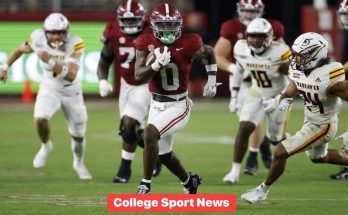The Tennessee Volunteers faced a significant challenge in their Week 2 matchup against East Tennessee State as five-star freshman offensive tackle David Sanders Jr. was ruled out for the second consecutive game. The highly touted Sanders, ranked as the No. 2 offensive tackle in the 2025 class, suffered a shoulder injury during practice prior to Tennessee’s season-opening win over Syracuse. His absence for the home opener on September 6, 2025, at Neyland Stadium forced head coach Josh Heupel and his staff to adjust the offensive line, which played a critical role in the Volunteers’ offensive strategy. Initially, Heupel had hoped Sanders could contribute against ETSU, but postgame remarks made clear that medical staff advised against it, prioritizing the long-term health and effectiveness of the young lineman. Heupel acknowledged the difficult decision, emphasizing that while Sanders’ presence is valuable, the team’s immediate priority was ensuring his shoulder fully recovers before facing more formidable opponents in the coming weeks.
Sanders’ injury created an immediate ripple effect across Tennessee’s offensive line. To compensate for his absence, the coaching staff reshuffled the lineup, moving Jesse Perry to right tackle and Wendell Moe Jr. to right guard. This adjustment demonstrated the Volunteers’ depth and flexibility along the line, allowing them to maintain a high level of performance despite the loss of one of the most promising freshmen in the program. The team’s offensive unit responded admirably, putting up 72 points against ETSU and showcasing their ability to execute complex schemes even under personnel changes. Sanders’ absence, however, highlights the fragility inherent in relying on elite talent, particularly in the physically demanding SEC, where every matchup tests both depth and resilience.
While the Volunteers’ victory over ETSU was decisive, Sanders’ ongoing recovery adds a layer of uncertainty as Tennessee prepares for its SEC opener against No. 4 Georgia. The matchup with the Bulldogs represents a substantial step up in competition, and the presence of Sanders on the offensive line could be pivotal in providing both protection for the quarterback and stability for the running game. Offensive tackles play a critical role in both pass protection and run blocking, and a player of Sanders’ caliber offers not only physical ability but also technical skill that can neutralize elite defensive threats. Coach Heupel’s optimism about a potential return next week provides hope for the program, but the medical staff’s cautious approach underscores the importance of balancing competitive desires with the long-term health of the athlete.
Tennessee’s handling of Sanders’ situation illustrates the delicate balancing act college football programs often face when managing injuries. Freshman players, especially those with high profiles and significant expectations, can be game-changers, but rushing them back from injury carries risks that can impact both the individual’s career and the team’s performance. By prioritizing Sanders’ recovery, the Volunteers demonstrate a commitment to sustainable development, ensuring that when he does step onto the field, he is fully prepared to contribute at a high level. The decision also reflects broader strategic considerations; while Tennessee dominated ETSU without Sanders, the upcoming SEC schedule demands a roster that is not only talented but also durable and well-prepared.
The Volunteers’ offensive line depth was tested in Sanders’ absence, and the performance against ETSU highlighted both strengths and areas for growth. Jesse Perry and Wendell Moe Jr. stepped into new roles seamlessly, providing a testament to the coaching staff’s preparation and the players’ versatility. Tennessee’s offensive scheme, which relies heavily on strong line play to establish the run and protect the quarterback, benefited from the cohesive adjustments made in real time. The offensive line’s ability to adapt will be critical in the weeks ahead, especially against teams with elite pass rushers that can exploit even minor lapses in protection. Sanders’ eventual return could solidify the line, giving the Volunteers a formidable front that combines size, athleticism, and technique, which is essential when competing in the SEC.
In addition to the physical demands, Sanders’ absence carries psychological and strategic implications. High-profile recruits often bring both skill and confidence to a program, and teammates look to these players for leadership and inspiration, even as freshmen. The Volunteers’ ability to maintain focus and execute at a high level without Sanders demonstrates maturity and depth within the squad. Nonetheless, having Sanders healthy and integrated back into the lineup could enhance morale and provide additional options for Heupel’s play-calling, particularly in high-stakes scenarios against ranked opponents. His presence would also allow Tennessee to rotate linemen strategically, maintaining energy levels and mitigating the risk of fatigue or injury over the course of a grueling SEC schedule.
The coaching staff’s communication around Sanders’ status has been transparent, reflecting a broader trend in college football toward prioritizing player safety and long-term health. By clearly outlining the reasons for his absence and projecting a potential timeline for his return, Heupel provides both media and fans with a realistic picture of the team’s readiness. This transparency helps manage expectations, particularly in a season where early matchups against non-conference opponents can be less indicative of the challenges that lie ahead in conference play. It also allows opponents to prepare strategically, although the Volunteers’ depth and adaptability ensure that Sanders’ absence does not compromise overall effectiveness.
Looking forward, the Volunteers’ coaching staff will continue to monitor Sanders’ progress closely, working with medical professionals to optimize his rehabilitation and ensure he returns in peak condition. The SEC schedule will test Tennessee’s offensive line in ways that extend beyond raw talent, requiring communication, technique, and cohesion under pressure. Sanders’ eventual return has the potential to elevate the entire unit, providing a stabilizing presence and enhancing the team’s ability to execute complex offensive schemes. His development as a freshman offensive tackle will be a key storyline for Tennessee, not only in terms of immediate impact but also as a foundation for future seasons.
The broader context of Sanders’ injury underscores the challenges faced by elite recruits transitioning to college football. Five-star athletes often carry high expectations and face significant pressure to perform early, but the physical intensity of collegiate practices and games requires careful management. Tennessee’s handling of Sanders reflects an understanding of these pressures and a commitment to fostering his long-term potential. By allowing him to recover fully, the Volunteers maximize the likelihood that Sanders can contribute effectively throughout the season and develop into a cornerstone of the offensive line for years to come.
Tennessee’s performance against ETSU, despite Sanders’ absence, offers encouragement that the team can weather adversity and maintain a high level of execution. The ability to dominate without one of their most talented linemen speaks to the depth, preparation, and adaptability of both the coaching staff and players. It also highlights the importance of developing a roster that is capable of stepping up when circumstances demand, a crucial factor for any program with championship aspirations. As the Volunteers turn their focus to the SEC opener against Georgia, the reintegration of Sanders could provide a critical boost, enhancing both offensive production and overall confidence.
In conclusion, the absence of David Sanders Jr. in Tennessee’s Week 2 game against East Tennessee State represents both a setback and an opportunity for the Volunteers. While missing a five-star talent is never ideal, the team’s dominant performance demonstrates resilience and depth, highlighting the capability of the coaching staff to adjust under pressure. Coach Josh Heupel’s management of the situation reflects a careful balance between competitive ambitions and player health, prioritizing long-term success over short-term gains. As Sanders continues his recovery, his eventual return could have a transformative impact on Tennessee’s offensive line, bolstering the team’s ability to face the formidable challenges of the SEC. The Volunteers have proven they can perform without him, but his presence will be invaluable as they pursue excellence in one of college football’s most competitive conferences. Managing expectations, fostering depth, and prioritizing health are all central to Tennessee’s strategy, and Sanders’ trajectory as a freshman offensive tackle will be closely watched as a key factor in the team’s success moving forward. His recovery, integration, and eventual impact will not only shape the remainder of the 2025 season but also provide a foundation for the Volunteers’ continued pursuit of dominance in the SEC.



